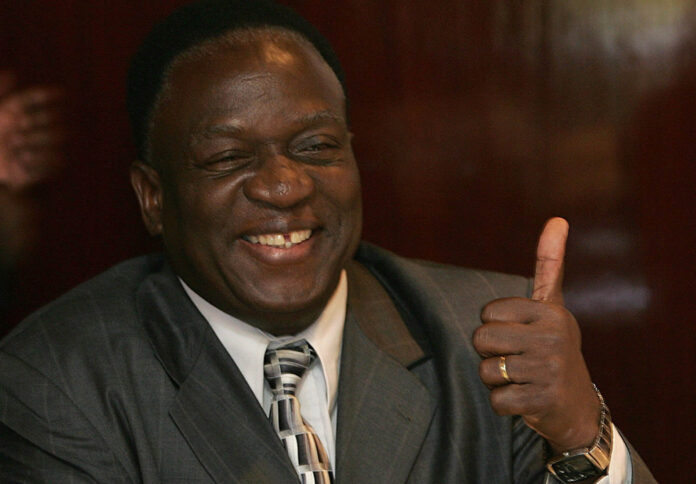President Emmerson Mnangagwa has ignited a heated debate after publicly supporting United States President Donald Trump’s decision to deport more than 500 undocumented Zimbabweans. The move is part of a broader crackdown on illegal immigration under Trump’s administration, which has enforced stringent immigration policies since November 2022. At least 545 Zimbabweans are among 1,445,549 non-citizens targeted for removal under a US Immigration and Customs Enforcement (ICE) programme.
In a post on X yesterday, Mnangagwa stated: “The government of Zimbabwe supports the United States government’s decision to repatriate and return our Zimbabwean citizens who may have been residing in the US illegally.” This statement has drawn mixed reactions, with some supporting the government’s stance while others criticise it as insensitive to the plight of Zimbabweans abroad.
This is not the first time Zimbabwe has faced the repatriation of its citizens from Western nations. In recent years, the United Kingdom (UK) has also deported Zimbabweans found to be living in the country illegally or overstaying their visas. Between 2020 and 2023, the UK government deported dozens of Zimbabweans as part of its efforts to enforce immigration laws.
In 2021, a charter flight carrying 14 Zimbabwean nationals landed in Harare, sparking outrage among human rights groups and activists. The deportees included individuals who had lived in the UK for years, some of whom claimed they faced persecution and economic hardship if they returned to Zimbabwe. The UK Home Office defended the deportations, stating that those removed had no legal right to remain in the country and had exhausted all avenues of appeal.
“The UK has a fair and humane immigration system, and we expect those with no right to remain in the country to leave voluntarily,” a Home Office spokesperson said at the time. However, critics argued that the deportations were insensitive, particularly given Zimbabwe’s ongoing economic challenges and political instability.
Human rights organisations, including the Zimbabwe Human Rights NGO Forum, condemned the move, warning that returnees could face significant difficulties reintegrating into a country grappling with high unemployment, inflation, and limited social services. Political analysts have also noted that the recent deportations from both the US and UK highlight the challenges faced by Zimbabweans seeking better opportunities abroad.
“The recurring theme of deportations underscores the desperation of many Zimbabweans, who leave the country due to economic hardships,” said Pardon Taodzera, a political analyst. “While host countries have the right to enforce their immigration laws, there is a need for a more compassionate approach, especially when dealing with individuals fleeing dire circumstances.”
Legal expert Aaron Hamauswa echoed these concerns, stating that the deportations could exacerbate Zimbabwe’s existing socio-economic challenges. “Returning citizens will need significant support to reintegrate into society,” Hamauswa said. “Without proper mechanisms in place, we risk creating a cycle of poverty and displacement.”
Local Government and Public Works Minister Daniel Garwe also weighed in on the issue, criticising Zimbabweans facing deportation from the US for opposing the ruling Zanu PF. He urged them to return home and contribute to nation-building. Garwe added that the deportation of African nationals by the American president was for Zimbabwe’s own good.
Critics, however, argue that the crisis in Zimbabwe is forcing citizens to seek greener pastures in other countries. “The government must address the root causes of migration, such as unemployment and poor governance, to prevent citizens from leaving in the first place,” said Herbert Chimuka, leader of the People’s Unity Party.
Despite the challenges, Zimbabweans living in the diaspora have played a significant role in supporting the country’s economy. Reserve Bank of Zimbabwe Governor John Mushayavanhu revealed that diaspora remittances contribute 17% to the country’s foreign currency inflows. This highlights the critical role played by Zimbabweans abroad in sustaining the nation’s economy, even as they face the threat of deportation.
The debate over the deportations has brought to the fore the complex interplay between migration, economic hardship, and governance in Zimbabwe. While the government has expressed support for the repatriation of its citizens, questions remain about how returnees will be reintegrated into a society already struggling with high unemployment and limited resources.
As the US and UK continue to enforce their immigration policies, the plight of Zimbabweans abroad remains a pressing issue. The government’s response to the deportations, and its ability to address the underlying causes of migration, will be closely watched by both citizens and international observers.
For now, the fate of the 545 Zimbabweans facing deportation from the US hangs in the balance, with many fearing the challenges that await them upon their return.

Follow @MyZimbabweNews












